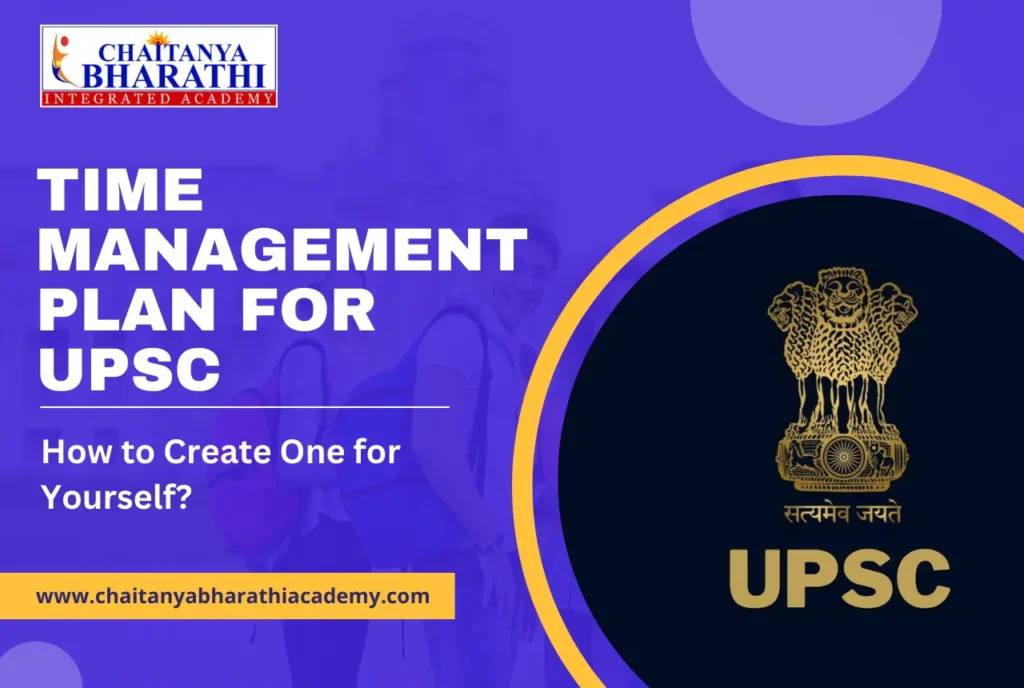The Union Public Service Commission (UPSC) exam is the gateway to a prestigious civil services career in India. Its vast syllabus and competitive nature make it a true test of knowledge, perseverance, and most importantly effective time management plan for UPSC.
While generic study plans might offer a starting point, they often fail to account for individual learning styles and preferences. To truly maximize your chances of success in the UPSC, a personalized approach is crucial.
This blog post aims to be your guide in crafting a time management plan for UPSC, empowering you to conquer The UPSC with confidence and efficiency.
Understanding Your Time to Create a Personalized Time Management Plan for UPSC

Effective time management begins with self-awareness. Before diving into specific strategies, take some time to understand your personal learning style, preferences, and limitations. This will form the foundation of your personalized plan.
Guide students through self-assessment exercises to identify:
Self-Assessment Exercises:
- Identify Your Learning Style: Are you a visual learner who thrives on diagrams and flashcards, or an auditory learner who benefits from lectures and discussions? Knowing your preferred style helps you choose study methods that maximize retention.
- Pinpoint Your Peak Hours: Are you a morning person or a night owl? Schedule demanding topics for your most productive hours and lighter tasks for times when your focus wanes.
- Recognize Your Distractions: Be honest about what takes away your study time. Social media, phone notifications, or even a cluttered workspace can be major time sinks. Identify your triggers and develop strategies to minimize their impact.
- Evaluate Your Available Time: Consider your daily commitments, including work, family responsibilities, and personal needs. This provides a realistic picture of the time you can realistically dedicate to studying.
Prioritization Tool: The Eisenhower Matrix:
Once you’ve gathered data about your time, utilize the Eisenhower Matrix to prioritize tasks. This tool categorizes tasks based on urgency and importance, helping you focus on what truly matters.
Additionally, consider leveraging tools: Time trackers or productivity apps can help you collect data on your study habits and identify areas for improvement.
Building Your Plan: Structure & Flexibility
Now that you understand your time and priorities, it’s time to build a structured yet flexible schedule. Different time management methods offer varying approaches to structure your study time.
Popular Techniques:
- Pomodoro Technique: This method involves working in focused 25-minute intervals, separated by short breaks. It promotes concentration and helps avoid burnout.
- Time Blocking: Divide your day into specific blocks dedicated to different subjects, ensuring focused study time for each.
- Batching: Group similar tasks together; for instance, complete all your writing practice at once instead of scattering them throughout the day.
Guide students through creating a realistic daily, weekly, and monthly schedule for:
Choosing the Right Method:
There’s no “one size fits all” approach. Experiment with different methods and find the one that best suits your learning style and schedule. Consider your focus levels and ability to manage time within a block.
Building Your Personalised Schedule:
- Daily Schedule: Allocate dedicated slots for:
- Subject-specific study: Distribute time based on syllabus weightage and your understanding of each subject.
- Revision and practice: Schedule regular sessions for revising concepts and practising through previous years’ papers and mock tests.
- Current affairs: Dedicate time daily or weekly to stay updated through newspapers, magazines, or online platforms.
- Breaks and relaxation: Include short breaks throughout the day to refresh your mind and prevent fatigue. Allocate time for physical activity and other personal needs to maintain overall well-being.
- Weekly Schedule: Utilise this to plan longer study sessions, allocate time for group discussions or coaching sessions, and schedule time for mock tests.
- Monthly Schedule: Plan for monthly revisions, major milestones like completing specific portions of the syllabus, and taking breaks for personal commitments like exams or celebrations.
Remember:
- Flexibility is key: As you progress, evaluate your plan regularly. Adjust based on your learning pace, feedback from mock tests, and unexpected events. Your schedule should support your progress, not hinder it.
- Stay realistic: Don’t overload your schedule. Include buffer time for unforeseen circumstances and prioritize quality study sessions over unrealistic quantity.
Tools & Resources to Optimise Your Plan

Equipping yourself with the right tools can significantly enhance your time management strategy. Here are some free and paid options to consider:
Planning and Scheduling: Utilise online calendars, mobile apps, or even physical planners to visualize your schedule and stay organized.
Time Tracking and Analysis: Time tracking apps can help you understand your study habits and identify areas for improvement. Free options are available, and paid versions often offer advanced features like detailed reports and analytics.
Note-taking and Organization: Digital note-taking apps allow you to organize your study materials effectively, while flashcards are great for memory retention. Explore free and paid options based on your preferences.
Mock Tests and Practice Papers: Many online platforms offer free and paid mock tests, while previous year’s UPSC papers are readily available online. Utilize these resources to simulate the exam format and practice time management during exams.
The Power of Community: Don’t underestimate the power of online UPSC communities. Connect with fellow aspirants through forums or social media groups. These platforms offer valuable resources like shared notes, study strategies, and moral support, fostering a sense of community and motivation. Remember, you’re not alone in this journey!
Maintaining Momentum: Overcoming Challenges
The UPSC journey can present various time management challenges:
- Procrastination and Distractions: Social media, phone notifications, and even mundane tasks can easily derail your focus.
- Feeling Overwhelmed: The sheer volume of the UPSC syllabus can be daunting.
- Fatigue and Motivation: Maintaining consistent motivation and energy levels throughout the long preparation phase is crucial.
Practical tips and Strategies to overcome these challenges:
Strategies for Success:
- Break It Down: Don’t try to tackle the entire syllabus at once. Set realistic daily and weekly goals, and further break down complex subjects into smaller, manageable chunks. Completing smaller tasks provides a sense of accomplishment and boosts motivation.
- Reward Yourself: Celebrate your achievements, big or small. Implement a reward system for completing tasks or reaching milestones. This can be anything from taking a break to enjoy your favorite hobby to indulging in a small treat.
- Find Your Tribe: Join a study group or find a study buddy to hold each other accountable and share strategies. Discussing topics and keeping each other motivated can prove invaluable.
- Prioritise Wellness: Address fatigue with mindfulness techniques like meditation or deep breathing exercises. Maintain a healthy sleep schedule and prioritize physical activity to combat stress and enhance focus.
- Seek Support: Don’t hesitate to seek guidance from mentors, educators, or even counselors if you’re facing significant challenges. Sharing your struggles and receiving professional advice can help you navigate hurdles and stay on track.
Remember, conquering the UPSC is a marathon, not a sprint. By acknowledging challenges, implementing effective strategies, and prioritizing your well-being, you can manage your time effectively and pave the way for success.
Conclusion: Your Journey, Your Plan
The UPSC exam demands meticulous planning and efficient time management. By prioritizing self-awareness and personalization, you can craft a strategy that aligns perfectly with your learning style and schedule. Remember, flexibility is key. Adapt your plan as needed, leverage the power of resources and community, and don’t hesitate to seek support when needed.
This journey is yours, and crafting a time management plan tailored to your strengths and needs is the first step towards conquering the UPSC with confidence and, most importantly, enjoying the process of learning and growth.












